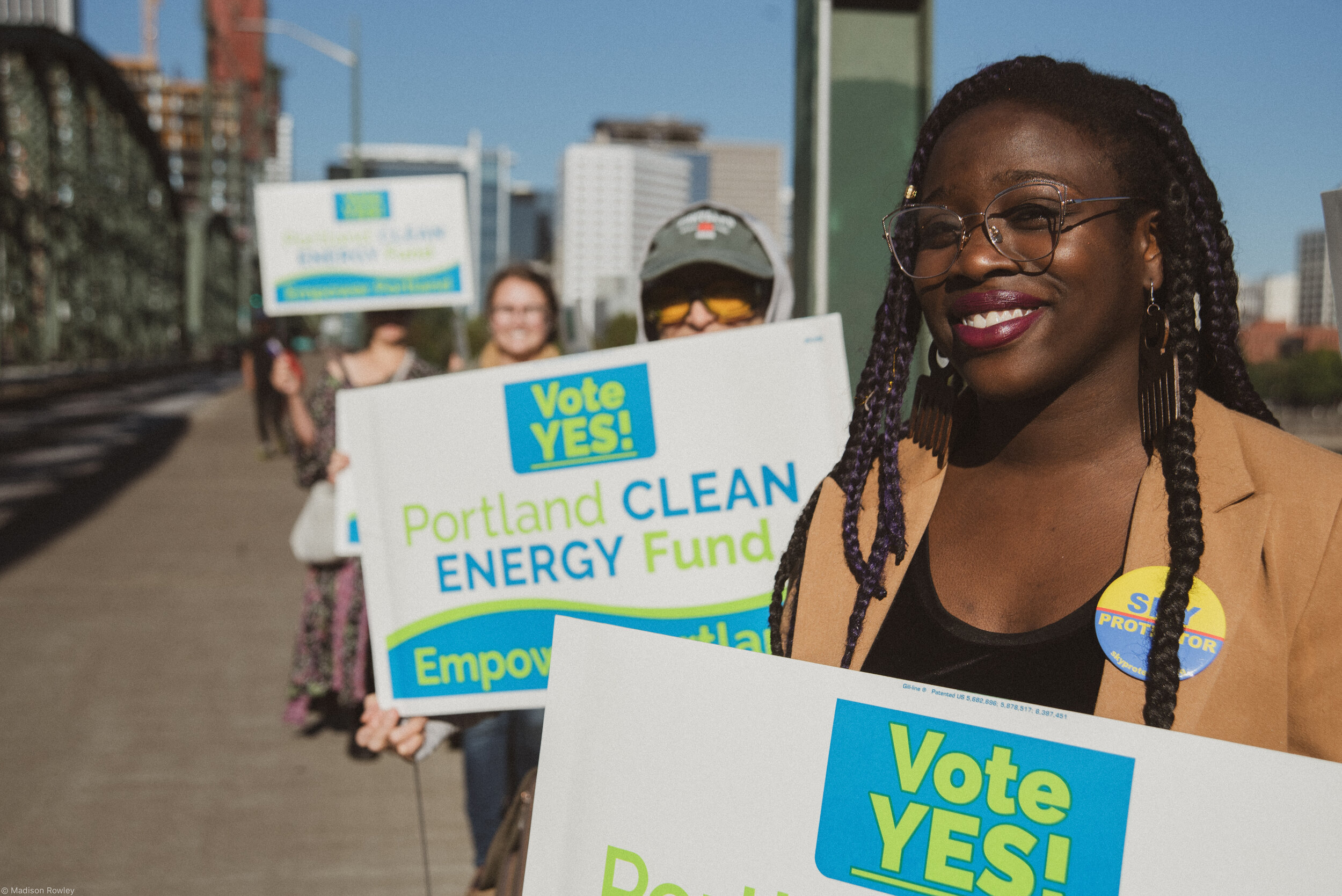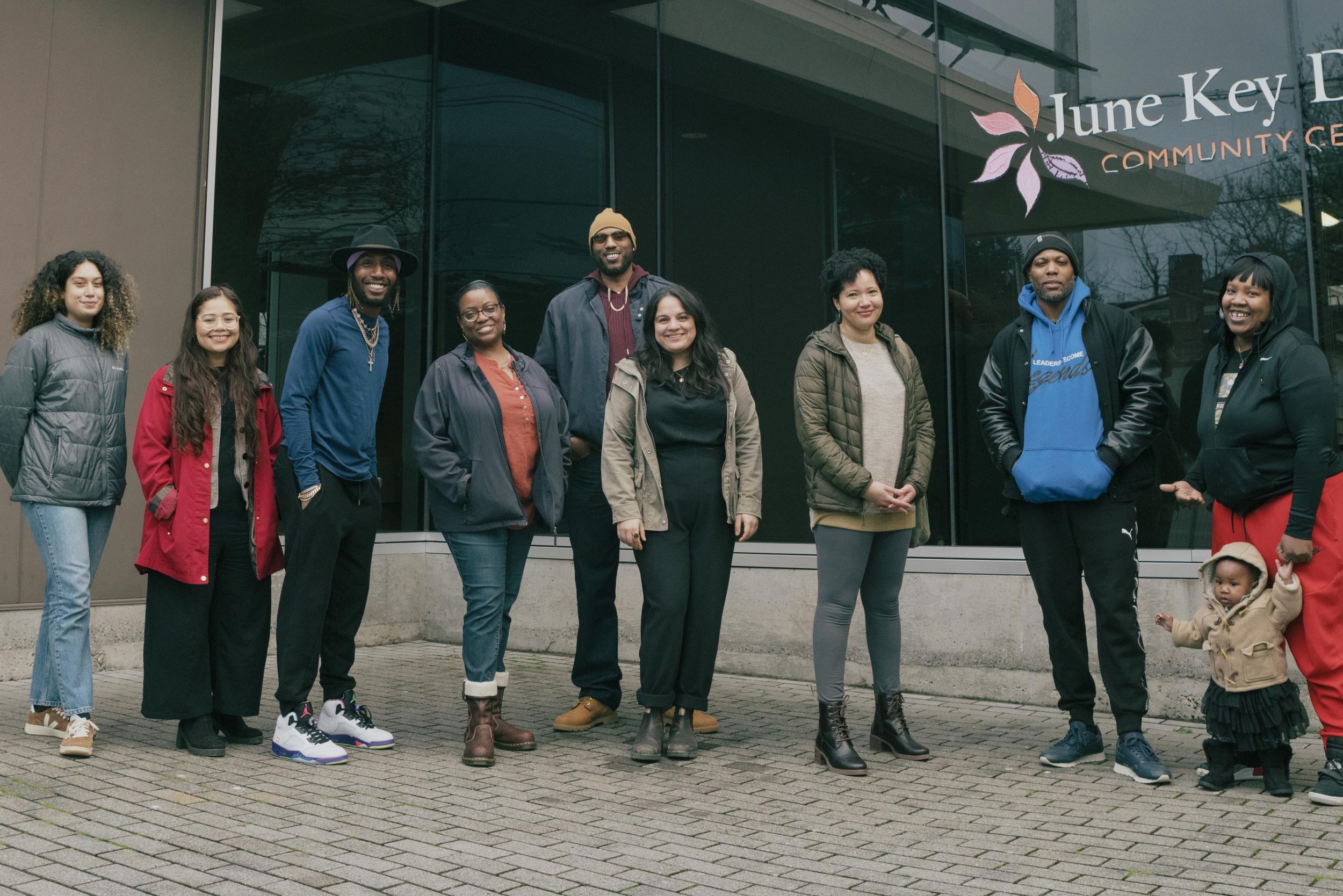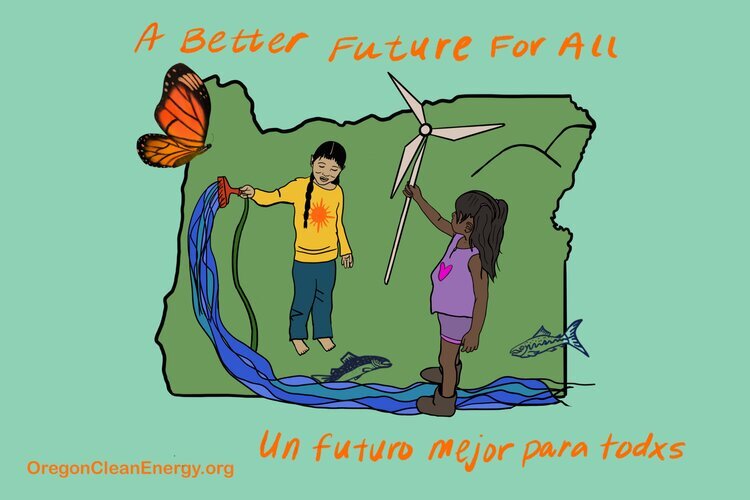ENVIRONMENTAL JUSTICE
Alert: Sign up for low-income energy bill discount programs! For example, a household of four with an income of less than $60,000 could qualify for a discount of 25% or more on home electricity and gas bills. Sign up at your utility providers’ website below:
Table of Contents:
Artwork by Erica Alexia (@ericalexia)
What is environmental justice?
Communities of color in Oregon have disproportionately experienced poor health outcomes due in part to exposure to pollution from fossil fuels, industrial agriculture, and poor forest management. At the same time, climate change has added additional environmental risks to Black, Brown, and poor communities. All Oregonians have experienced more frequent, more severe weather that threatens our food, air, and water, and many community members have suffered the consequences of lack of action. Centering the needs of communities who are on the “front lines” of climate change and environmental pollution in our advocacy for climate and environmental solutions means justice for everyone who experiences the greatest harms from these crises.
Our Approach:
We gather in coalitions with environmentalists, labor unions, health professionals, businesses, and faith communities to build relationships and find pathways to change. This work broadens Oregon’s environmental and climate movements so that we can provide environmental benefits to the most impacted people.
We grow community engagement and input in existing policy discussions, ensuring that we are grounded in the lived experiences of communities of color and low-income communities. This prevents harm, ensures benefits, and inclusive participation in policy solutions.
We build towards climate solutions that serve future generations to thrive. We center the voices of those most impacted by climate change to ensure our solutions address present and historical harms.
Energy Justice:
Energy Justice aims to address historic and ongoing social, economic, and health burdens inflicted by energy industries upon marginalized communities through policy, programming, and wealth-building.
Energy Justice is about more than renewable energy. Energy Justice means no one is burdened by huge utility bills, everyone has fair access to good-paying jobs in the green economy, and the transition to clean energy must prioritize benefits and cause no further harm to communities impacted by pollution and environmental disruption from power sources such as gas-fired power plants, hydroelectric dams, and nuclear power.
Along with our statewide and regional partners, our environmental justice department works on the following issues:
Photo Credit: Madison Rowley (2018)
The Portland Clean Energy Fund (PCEF) is a grant program at the City of Portland that distributes $44-61 million annually to community-based organizations for clean energy, workforce development, and green infrastructure. Established in 2018 via a City of Portland ballot measure that earned 65% of the vote, PCEF is the first-ever climate justice fund in the United States and Oregon’s first environmental initiative created and led by communities of color. The Coalition of Communities of Color and several of our members (Verde, APANO - the Asian Pacific American Network of Oregon, and the Native American Youth And Family Center) were core leaders in a broad coalition effort to develop and pass PCEF at the ballot.
At least 50% of renewable energy and energy efficiency programs funded by PCEF must benefit communities of color and low-income Portlanders. Additionally, at least 20% of PCEF dollars shall be awarded to organizations with a stated mission and track-record of programs that benefit economically disadvantaged community members, including people of color, women, people with disabilities, and the chronically unemployed.
CCC staff with Governor Kate Brown, State Rep. Khanh Pham, and coalition partners at the bill-signing ceremony for Energy Affordability and 100% Clean Energy for All. Photo Credit: Meredith Connolly, 2021
The Oregon Clean Energy Opportunity campaign was a historic coalition effort that successfully passed three bills in the 2021 Oregon state lawmaking session:
The Energy Affordability Act (House Bill 2475)
This bill allows the Oregon Public Utility Commission to approve discounts and rate structures to ensure the low-income households do not become energy cost-burdened. The bill also allows environmental justice organizations to receive funding to intervene and participate in Public Utility Commission proceedings.
The Healthy Homes Repair Fund (House Bill 2842)
This bill creates a fund at the Oregon Health Authority with $10 million in initial funding to support home repairs and energy efficiency upgrades for low-income Oregon households. In addition to improving energy efficiency through insulation and other means, repairs can include smoke filtration, home-hardening to improve fire resilience, and lead, mold, and radon abatement.
100% Clean Energy for All (House Bill 2021)
This bill requires Pacific Power and Portland General Electric to eliminate 100% of the state’s greenhouse gas emissions from power generation by 2040, with interim targets of 90% reductions by 2035 and 80% reductions by 2030. The bill also includes fair wage and labor standards, a ban on new or expanded gas-fired power plants, and $50 million in grants for community-based renewable energy projects such as shared rooftop solar.
The Coalition of Communities of Color was highly involved in the passage of these three Clean Energy Opportunity bills and proceeded to support implementation of the bills at relevant state agencies.
Build/Shift team members in 2022.
Building Community / Shifting Power (Build/Shift) is a team of BIPOC (Black, Indigenous, & people of color) community members convened by the CCC, Verde, and the City of Portland’s Bureau of Planning and Sustainability. Team members bring lived experience and expertise to develop a community-driven policy around buildings and energy in the City of Portland.
Build/Shift acknowledges that the climate crisis is stacked on top of ongoing crises experienced by many Portlanders: a high cost of living and substandard housing that contributes to health problems and is expensive to heat and cool. And, the use of methane gas and electricity in Portland buildings contributes a combined total of 40% of the city’s greenhouse gas emissions. In light of these truths, Build/Shift proposes establishing minimum standards for existing buildings that:
Improve human health.
Reduce energy cost burden for tenants.
Reduce carbon emissions from buildings.
Consider risk of displacement upfront in policy design.
Make buildings more resilient to climate impacts.
Ensure that rental housing has standards related to cooling as climate change dangerously increases local temperatures, as we experienced during the summer 2021 heat dome event.
Learn more about Build/Shift:
Water Justice:
A changing climate, aging infrastructure across the state, and lack of ongoing investment in clean water have left Oregon’s water systems stressed. This has put our health, safety, economy and environment at risk. Communities of color, particularly those that are rural and low-income, are often on the front lines of these impacts, facing a wide range of threats, including rising utility rates, disparities in drought and flooding vulnerability, and exposure to nitrates, pesticides, and heavy metals.
In some rural counties, Native peoples and communities of color represent 30–40 percent of the population, yet face significant barriers to participating in state policy and infrastructure discussions. In metropolitan areas such as Eugene, Salem, and Portland, low-income communities and communities of color find themselves at high risk for water insecurity and climate-related disasters as documented during wildfires and seasonal flooding events.
Portland area elders at Portland All Nations Canoe Family Canoe launch - photo credit: Eddie Sherman
In light of these challenges, CCC became a convening partner of The Oregon Water Futures Project. The project is a collaboration between water and environmental justice interests, Indigenous peoples, communities of color, low-income communities, and academic institutions. Through a water justice lens, the Oregon Water Futures Projects aims to impact how the future of water in Oregon is imagined through storytelling, capacity building, relationship building, policymaking, and community-centered advocacy at the state and local level.
We recommend taking a look at the Oregon Water Justice Framework, published in November 2022, which provides policymakers with a roadmap for centering equity as they weigh the state’s many water needs.
Climate Justice:
Artwork by Erica Alexia (@ericalexia)
The Climate Justice movement acknowledges climate change can have differing social, economic, public health, and other harmful impacts on communities of color, low-income communities, and rural communities. The Climate Justice movement aims to integrate race, class, and gender justice into climate work to achieve a long-term vision of an equitable, environmentally sustainable future for all. The Environmental Justice department at the Coalition of Communities of Color are leaders in the regional and statewide climate justice movement.
The Kresge Foundation created the Climate Change, Health, and Equity (CHHE) Initiative to mobilize equitable climate action by health care institutions, health practitioners and community advocates in ways that reflect the needs and priorities of low-income communities in America's cities. Coalition of Communities of Color convenes our partners OPAL Environmental Justice, Asian American Pacific Network of Oregon, Verde, and Native American Youth and Family Center (NAYA).








